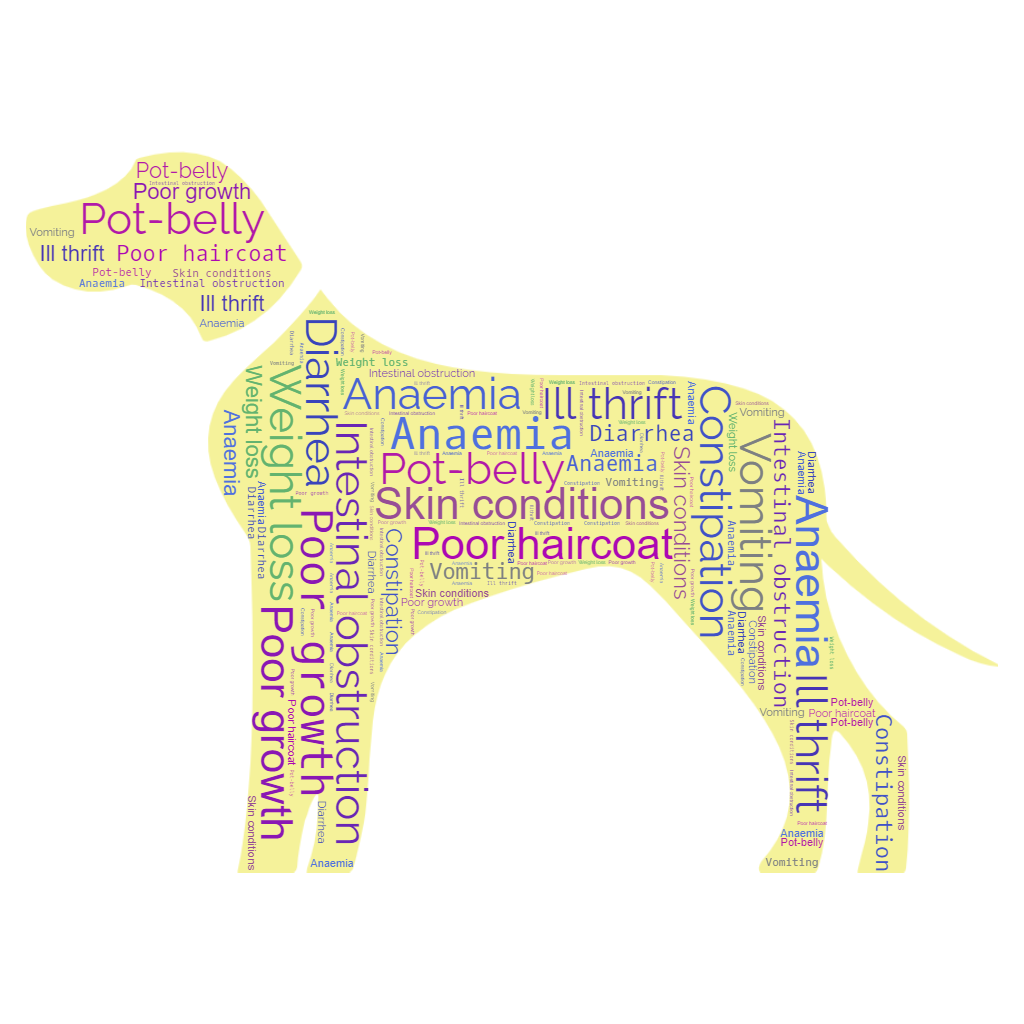Deworming plays a crucial role in ensuring the health and well-being of your furry companions. Both cats and dogs are susceptible to worm infections, some of which can even infect humans. In pets, worms can cause a range of health problems, from no apparent clinical signs to severe illness and even death. Many of these worms reside in your pet’s gut, primarily the intestines, leading to diarrhea, weight loss, poor nutrition, and anemia depending on the worm species.

Common Worms Infecting Dogs and Cats
Roundworms
Roundworms are the most common type of worms, especially among puppies and kittens. The main species infecting cats and dogs are Toxocara canis and Toxocara cati, respectively. These large white worms can grow to about 10 cm in length and reside in the intestine. In heavy infections, they can obstruct the intestines of young animals, causing serious health problems. Roundworms can also infect humans and may cause significant health issues if they migrate to vital organs such as the eyes and brain. Infection occurs primarily through ingestion of eggs with infective larvae, but can also happen from an infected mother to puppies during late pregnancy and through milk.
Hookworms
Hookworms in dogs are tiny (~1 cm) but can be detrimental because they feed on blood. High or untreated infections can cause severe and fatal anemia. The major hookworms in dogs and cats are Ancylostoma caninum, Ancylostoma braziliense, and Uncinaria stenocephala. Hookworm infections occur when infective larvae enter by penetrating the skin from the environment or through ingestion. Hookworms can also penetrate and migrate through human skin, causing a skin disease known as “cutaneous larval migrans.”
Tapeworms
Tapeworms are usually long, segmented worms. Several species infect dogs, including Dyphillidium caninum (Dog Tapeworm), Echinococcus granulosus (hydatid tapeworm), and Taenia species. Tapeworm infections are transmitted to dogs by eating infective stages in other hosts such as rats, mice, lamb, and beef, especially when fed raw. This is particularly important for cats due to their hunting behavior. Many of these tapeworms can also infect humans.
Other Worms
Whipworms (Trichuris sp.), Oesophageal worms (Spirocerca lupi), Kidney worms (Dioctophyma renale), and Bladder worms (Capillaria sp.) also infect pets but are less frequent.
Preventing Worm Infections
1. Regular Deworming
Your pet needs a proper dewormer that targets roundworms and tapeworms at regular intervals. It is recommended to deworm fortnightly starting from 2 weeks until 3 months of age. Subsequently, monthly deworming can be practiced. The frequency of treatment depends on factors such as behavior, environment, diet, and living conditions. Exclusively indoor pets that are well-managed and not exposed to uncooked meat might not need frequent deworming compared to free-roaming or outdoor pets. However, indoor animals can still get worm infections from the floor, insects, and other sources, though their infection burden is generally lower.
Deworming products for your fur baby can be found here
2. Proper Hygiene
Maintaining proper hygiene by responsibly disposing of your pet’s feces and preventing environmental contamination is essential. Providing a clean environment free from fleas and pests such as rats also helps prevent worm infections. Regular cleaning and bathing of your pet can limit self-infection or passing infections to other animals.
3. Ectoparasite Treatment
Ectoparasites such as ticks, fleas, and lice can transmit worm infections to your pet. For example, dog tapeworms are transmitted by fleas. Therefore, using preventatives against ectoparasites is crucial.
Ectoparasite preventatives for your fur baby can be found here
4. Proper Nutrition
Healthy nutrition helps animals maintain a robust immune system. If infected, well-nourished pets typically exhibit less severe clinical signs compared to those that are undernourished.
Ensuring your pets are free from worm infections is essential for their health and the health of your family. Regular deworming, proper hygiene, ectoparasite treatment, and good nutrition are key practices to keep your furry friends healthy and happy.
Useful Links and sources:
Gastrointestinal Parasites of Dogs (Pet owner version) MSD Veterinary manual

